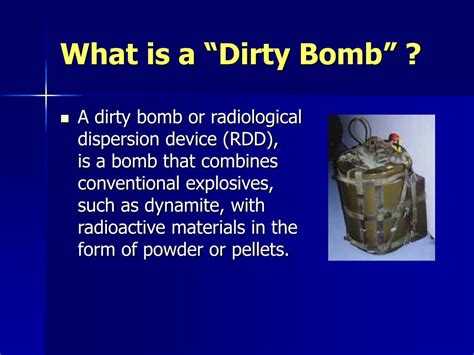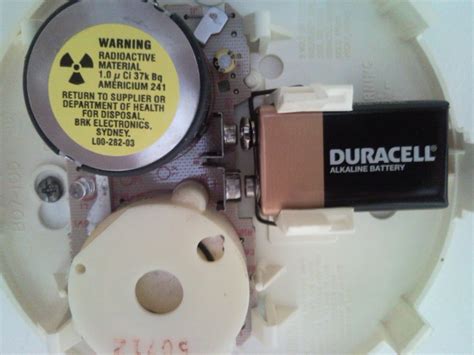Whats A Dirty Bomb

A dirty bomb, also known as a radiological dispersal device (RDD), is a type of explosive device that combines conventional explosives with radioactive materials. The primary purpose of a dirty bomb is not to create a nuclear explosion, but rather to disperse radioactive material over a wide area, contaminating the environment and causing harm to people and the ecosystem. The term "dirty" refers to the radioactive nature of the device, which can spread radioactive contamination, making it a highly feared and potentially devastating weapon.
How Dirty Bombs Work

A dirty bomb typically consists of a conventional explosive, such as dynamite or TNT, surrounded by a radioactive material, such as uranium, cesium, or strontium. When the explosive detonates, it disperses the radioactive material into the air, creating a plume of radioactive particles that can be carried by the wind over a large area. The radioactive material can then be inhaled, ingested, or come into contact with the skin, causing radiation exposure and potentially leading to radiation sickness.
Types of Radioactive Materials Used
The type of radioactive material used in a dirty bomb can vary, but common examples include:
- Uranium-238 (U-238): a highly radioactive isotope with a long half-life
- Cesium-137 (Cs-137): a highly radioactive isotope with a medium half-life
- Strontium-90 (Sr-90): a highly radioactive isotope with a medium half-life
These materials can be obtained from a variety of sources, including nuclear power plants, medical facilities, and industrial sites.
| Radioactive Material | Half-Life | Radiation Type |
|---|---|---|
| Uranium-238 | 4.5 billion years | Alpha, Beta, Gamma |
| Cesium-137 | 30.2 years | Beta, Gamma |
| Strontium-90 | 29.1 years | Beta |

Effects of a Dirty Bomb Explosion

The effects of a dirty bomb explosion can be severe and long-lasting. The initial blast can cause damage to buildings and infrastructure, while the radioactive material can contaminate the air, water, and soil, leading to radiation exposure and potentially causing radiation sickness. The extent of the damage and contamination depends on various factors, including the size and type of the device, the amount and type of radioactive material used, and the prevailing weather conditions.
Radiation Exposure and Health Effects
Radiation exposure from a dirty bomb can cause a range of health effects, from mild to severe. These can include:
- Radiation sickness: a condition caused by exposure to high levels of radiation, which can lead to symptoms such as nausea, vomiting, diarrhea, and even death
- Cancer: exposure to radiation can increase the risk of developing cancer, particularly leukemia and other blood cancers
- Genetic damage: radiation exposure can cause genetic mutations, which can be passed on to future generations
Key Points
- A dirty bomb is a type of explosive device that combines conventional explosives with radioactive materials
- The primary purpose of a dirty bomb is to disperse radioactive material over a wide area, contaminating the environment and causing harm to people and the ecosystem
- The effects of a dirty bomb explosion can be severe and long-lasting, causing radiation exposure and potentially leading to radiation sickness and other health effects
- The development and deployment of dirty bombs are strictly prohibited under international law
- Efforts are being made to prevent the proliferation of radioactive materials and to develop effective countermeasures
Prevention and Countermeasures
To prevent the development and deployment of dirty bombs, efforts are being made to:
- Secure and monitor radioactive materials
- Develop and implement effective detection and response systems
- Provide training and equipment to first responders and emergency personnel
- Develop public awareness and education campaigns
What is the primary purpose of a dirty bomb?
+The primary purpose of a dirty bomb is to disperse radioactive material over a wide area, contaminating the environment and causing harm to people and the ecosystem.
What are the potential health effects of radiation exposure from a dirty bomb?
+Radiation exposure from a dirty bomb can cause a range of health effects, from mild to severe, including radiation sickness, cancer, and genetic damage.
What is being done to prevent the development and deployment of dirty bombs?
+To prevent the development and deployment of dirty bombs, efforts are being made to secure and monitor radioactive materials, develop and implement effective detection and response systems, provide training and equipment to first responders and emergency personnel, and develop public awareness and education campaigns.
In conclusion, dirty bombs are a highly feared and potentially devastating type of explosive device that can cause widespread fear, disruption, and harm to the environment and human health. The development and deployment of dirty bombs are strictly prohibited under international law, and efforts are being made to prevent the proliferation of radioactive materials and to develop effective countermeasures.



